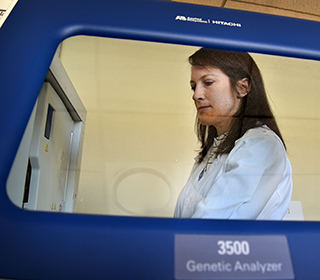Latest News Archive
Please select Category, Year, and then Month to display items
01 July 2021
|
Story Dikgapane Makhetha
|
Photo Supplied

This year, the young people of South Africa celebrated 45 years of the annual commemoration of
Youth Day. The University of the Free State (UFS)
Community Engagement (CE) office on the
Qwaqwa Campus has engaged a number of stakeholders in the call to use football as a means of bringing people together, transforming lives, and enthusing communities. Through partnerships, community organisations have great potential to create opportunities for breaking down barriers and inspiring social cohesion, initiating enablement through the development of social projects, and promoting education and health awareness.
On 16 June this year, local community organisations collaborated in the hosting of a soccer event for the youth of Qwaqwa at the FIFA Football for Hope Stadium in Tsheseng.
The Agape Foundation for Community Development,
Love Life,
Right to Care,
Youth in Action, Qwaqwa FIFA Project, and the Tsheseng Athletics Club were all stakeholders who diligently joined forces to ensure the successful launch of the tournament. Community development practitioners, who are trainees in the UFS Qwaqwa Department of Community Development, were garbed in departmental branded gear and have cautiously facilitated adherence to COVID-19 protocols. About 250 people, including football fans and participants, attended and enjoyed the entertaining games. Through the partnered recreational project, the Qwaqwa Campus CE office responded to the 2021 Youth Day theme: ‘Growing Youth Employment for an inclusive and transformed society’, by enhancing opportunities for networking among stakeholders. Football is popularly known for promoting transformational social projects in diverse communities across the globe.
New Division of Virology to deliver crucial services for HIV diagnosis and resistance testing
2015-12-14

The establishment of a Division of Virology within the Department of Medical Microbiology, under the joint auspices of the UFS and the National Health Laboratory Service (NHLS), reflects the continued growth within Virology. Dr Dominique Goedhals, Head of the Division, says the division will also provide training of undergraduate medical students, medical technologists and technicians, and registrars. |
The newly established Division of Virology at the University of the Free State will be one of only five laboratories in the country to be involved in crucial diagnostic and testing services for HIV viral load monitoring, early infant diagnosis, and HIV resistance testing.
The Virology Diagnostic Laboratory serves as the reference laboratory for all HIV National Priority Programme samples for the Free State and Northern Cape provinces.
Medical staff at the laboratory will provide a 24-hour consultative service, as well as outreach programmes to district laboratories in the Free State and Northern Cape where pathologists are not available.
Dr Dominique Goedhals, Head of the Division of Virology, says this division, under the joint auspices of the UFS and the National Health Laboratory Service (NHLS), reflects the continued growth within Virology.
The division will not only deliver this critical diagnostic service, but will also focus on training and teaching, as well as research.
Teaching and training activities include teaching of undergraduate medical students, medical technologists and technicians, and registrars. The postgraduate science programme has a high output of honours, master’s and doctoral students in Virology. The intern medical scientist programme is also active, with five interns having successfully submitted their portfolios since the programme was implemented in 2010.
Research activities under the Head of Research, Prof Felicity Burt, have also expanded and continue to show increases in publication output and acquisition of grant funding. Established research groups within the Division of Virology focus on vector-borne and zoonotic viruses, human papilloma viruses (HPV), and human immunodeficiency virus (HIV), as well as work with a number of international collaborators.